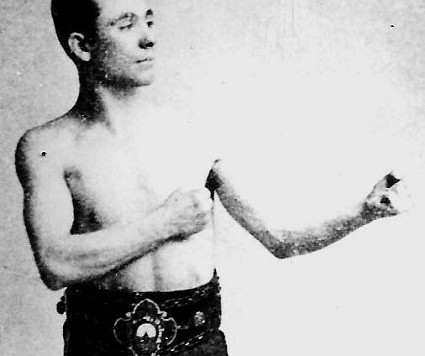(Pedlar “Box O’ Tricks” Palmer; via)
The creation of a rivalry — or even a fistic foil character — begins somewhere, and often the beginning doesn’t capture the overall result of the series. Roberto Duran being knocked down and decisioned by Esteban De Jesus was shocking, maybe even overshadowing the fact that he was stopped twice as punishment; Ray Robinson’s first meeting with Jake LaMotta ended in a relatively uneventful and, per reports, “unimpressive” decision win for Robinson.
That first chapter in the story of these rivalries is still a necessary one, though, leading to significant chunks of boxing history that feed yet more punch-driven records. In this instance, two of the best fighters around, and two of the more notable really small fighters ever, crossed paths and sparked their own fuse, with Thomas “Pedlar” Palmer meeting George Dixon on January 30, 1896.
Palmer had just won over Billy Plimmer by DQ in November of 1895, in what is generally accepted as the first time a title changed hands by DQ. In the aftermath, the Idaho Statesman called Palmer a “world beater.” The result was an unexpected one, and as Plimmer had previously beaten Dixon on points, a Palmer vs. Dixon showdown was a natural — even as something akin to a six round exhibition.
*******
Palmer was en route to the U.S. a week before the bout, and the event was covered by press beforehand, seen almost as a kind of promotional tool for both fighters as much as anything else. Dixon was a well-known figure in New York City, and the featherweight champion of the world, having also been involved in numerous police run-ins.
Despite that, more than a few of his bouts had ended by police stoppage, Dixon was the older, more experienced battler, fighting past 20 rounds seven times before sparring with Palmer.
Upon his arrival in New York on January 25, a special dispatch to the Boston Herald said of the Brit Palmer, “He dresses neatly and is intelligent. He will stay in America but two weeks and then return to England. He will not fight any here, and the only chance for the public to see him will be when he boxes six rounds next Thursday night with George Dixon at Madison Square Garden. Palmer says that as he has beaten the champion bantam of the world [Billy] Plimmer, anybody desiring to fight will have to go to England, where a good purse will be forthcoming at any time.”
The “Barbados Demon” Joe Walcott fought Jim Jackson on the undercard of what was locally dubbed a “first class” card. The Walcott-Jackson fight had its own storyline to it, as Jackson was said to have won $50 from Walcott at the Miner’s 8th Avenue Theater by simply lasting four rounds with him on a non-sanctioned fight card.
The bout was apparently a close one, or difficult to score, rather, as different publications couldn’t seem to agree on who should have won what. The Denver Post’s headline read, “The colored featherweight had the best of it from the start, but the allotted six rounds did not give enough time to knock out the Englishman.” That of the Boston Herald said, “Palmer as good as Dixon,” while the New York Herald-Tribune said, “Dixon… clearly displayed his superiority.”
What most seemed to agree upon, was that Pedlar Palmer was quick and often too slippery for Dixon in the early rounds, countering with snap and moving away before Dixon could respond.
The New York Herald reported, “[Palmer] hits straight out from the shoulder with force, and is quick as a flash. At ducking and side stepping he is wonderfully clever. He is also very cool, and after dodging a vicious swing would look Dixon in the eye as much as to say: ‘Never touched me. Try again.’ As a boxer he is Dixon’s superior, but whether he is a greater fighter on a finish contest can determine.”
But Dixon did what many fighters know to do, to this day, with a fighter that’s using his legs a lot: assault the body. Dixon’s body attack in the 5th and 6th rounds and hard-swinging rushes wore on Palmer by the end, but the fairest result appeared to be a draw. Though he wasn’t needed, Police Inspector Brooks was on hand, ready to intervene by force if necessary.
Palmer would fight George Dixon three more times, with the series ending at 2-2 on a points win in 20 rounds for Dixon. Within a few years of their rivalry concluding, both men had ostensibly ended their careers; Terry McGovern would seriously derail the careers of both men along the way.

